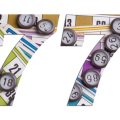1. Understanding Intuition: From Gut Feelings to Practical Wisdom
What Is Intuition?
Intuition is often described as a “gut feeling” or an inner sense that guides us, even when we don’t have all the facts. In American culture, phrases like “trust your gut,” “go with your instincts,” or “something just feels off” are part of everyday language. But what exactly happens in our minds and bodies when we experience intuition?
The Science Behind Gut Instincts
Psychologists explain that intuition is a form of rapid information processing. Our brains take in countless cues from our environment—facial expressions, body language, tone of voice—and quickly piece them together to help us make decisions. While these processes may feel mysterious, they’re rooted in real psychological mechanisms that everyone uses every day.
| Aspect of Intuition | How Americans Experience It | Common Scenario |
|---|---|---|
| Gut Feeling | A physical sensation in the stomach or chest | Sensing danger or opportunity before having evidence |
| Snap Judgment | Making quick choices without conscious reasoning | Selecting a job candidate during an interview |
| Pattern Recognition | Noticing familiar situations subconsciously | Picking up on someone’s mood changes at work or home |
| Emotional Clues | Feeling uneasy or excited for no clear reason | Deciding whether to trust a new acquaintance |
The Role of Intuition in Daily American Life
In the United States, intuition isn’t just a mystical concept—it’s woven into how people make everyday decisions. Whether it’s choosing who to sit next to at lunch, sensing when a child needs comfort, or deciding if a business deal feels right, Americans rely on their intuitive senses more often than they might realize.
Real-Life Examples: How Americans Use Intuition Every Day
- At Work: Managers may hire someone because the candidate “just seemed like a good fit.”
- In Relationships: Friends might notice something is wrong before being told, simply by observing body language.
- In Parenting: Parents often know when their child is upset, even if the child says everything is fine.
- Shopping Decisions: Consumers might choose one brand over another because it “feels right.”
The Practical Wisdom of Trusting Yourself
While data and logic are important in American society, people also value the wisdom that comes from within. Trusted gut feelings are not only respected but sometimes celebrated—think about popular sayings like “go with your heart” or “listen to your inner voice.” Learning to recognize and use intuition can be a practical tool for making smarter, faster decisions in daily life.
2. The Landscape of Divination in American Culture
Divination isn’t just a mystical pursuit anymore—it’s becoming a part of daily life for many Americans. Tools like tarot cards, astrology charts, and numerology calculators are showing up everywhere from popular apps to workplace team-building exercises. This growing trend is all about making intuition practical, relatable, and even fun.
How Divination Tools Became Mainstream
Over the past decade, divination practices have shifted from fringe hobbies to mainstream cultural touchstones. Social media influencers share their daily tarot spreads on Instagram, while astrology memes go viral across platforms like Twitter and TikTok. Celebrities openly discuss their zodiac signs and personal numerology numbers in interviews, making it feel normal and even cool to explore these tools.
| Divination Tool | Mainstream Usage Example | American Cultural Touchpoint |
|---|---|---|
| Tarot | Guided self-reflection via apps or group readings at events | Coffee shop tarot nights, wellness retreats |
| Astrology | Daily horoscopes in major magazines and personalized birth charts online | Zodiac-themed merchandise, astrology dating app filters |
| Numerology | Name and birthday analysis for goal setting or self-discovery | Life path number discussions on podcasts, business branding workshops |
The Appeal: Blending Intuition With Data-Driven Living
Americans love practical solutions—and divination fits right in by offering both insight and structure. For example, astrology apps use your birth data to generate personalized daily advice. Tarot apps help you track your mood or journal your thoughts over time, combining ancient wisdom with modern analytics. Numerology calculators turn names and dates into actionable guidance for career moves or relationship questions.
Integration Into Everyday Life
- Morning Routines: People check their horoscope or pull a single tarot card before work, treating it like a weather forecast for their emotions.
- Workplace Wellness: Companies invite astrologers or numerologists for team-building sessions—making self-awareness part of corporate culture.
- Social Events: Friends host tarot parties or exchange astrology readings at birthdays and holidays, making divination a shared experience.
- Mental Health Support: Journaling with tarot or reflecting on one’s life path number helps many Americans find meaning during times of uncertainty.
Why It Resonates With Modern Americans
This rise in divination reflects America’s blend of individualism and community spirit. People want personal insights that feel unique but also crave shared experiences. By integrating these intuitive tools into routines—from coffee breaks to conversations—divination is no longer an outlier; it’s part of the everyday American story.
![]()
3. Blending Intuitive Practices into Daily Routines
Making Divination Part of Your Morning Ritual
For many Americans, mornings start with coffee and catching up on the news. Imagine adding a moment of intuition right before you check your phone. Whether it’s pulling a single tarot card or simply asking yourself what you feel about the day ahead, this simple step can set a positive, grounded tone. Keep your deck or oracle cards near your coffee maker as a visual cue. If you’re not into cards, try holding a favorite stone (like amethyst or quartz) and focusing on your intention for the day while you sip your coffee.
Sample Morning Routine Table
| Time | Activity | Intuitive Practice |
|---|---|---|
| 7:00 AM | Brew Coffee | Set intention for the day |
| 7:05 AM | Check headlines | Pull a daily tarot/oracle card |
| 7:10 AM | Get ready for work/school | Meditate with a grounding crystal for 3 minutes |
Journaling with an Intuitive Twist
Journaling is already popular in American self-care routines. To blend in divinatory wisdom, start by writing down a question or challenge you’re facing. Then, pull a card or use another tool (like runes or I Ching coins) to see what message comes through. Write about how this insight could apply to your situation. Over time, these notes can help you spot patterns and deepen your self-understanding.
Quick Journaling Prompts with Divination
- “What do I need to focus on today?” – Pull one card and reflect.
- “How can I handle this tough conversation at work?” – Try a three-card spread for past, present, and advice.
- “What’s blocking my creativity?” – Ask the question, then free-write after using your intuitive tool.
Using Intuition at Decision Points Throughout the Day
The average American faces dozens of decisions daily—from choosing lunch to tackling big projects. When you hit a crossroads, pause for just 30 seconds and check in with your gut feeling. If you have more time, jot down the options and notice which one feels lighter or more exciting. For bigger choices—like job offers or moving cities—consider setting aside time to meditate, use pendulums, or consult an oracle deck specifically dedicated to guidance.
Everyday Scenarios for Practical Divination
| Scenario | Intuitive Action Step |
|---|---|
| Selecting lunch options at work | Sit quietly for 10 seconds and notice which choice feels right in your body. |
| Navigating family disagreements at home | Pull a calming affirmation card before responding. |
| Tackling unexpected challenges (car trouble, missed deadlines) | Breathe deeply, hold a grounding object, and ask “What’s my next best step?” before acting. |
Cultivating Consistency: Make It Easy & Natural
The key to blending intuition into American routines is convenience. Place reminder sticky notes on your bathroom mirror (“Trust your gut!”), set calendar alerts for quick midday check-ins, or keep your favorite divination tools in places you frequent (car dashboard, office drawer). Treat these moments like mental stretching—small but powerful ways to stay connected to yourself amid daily chaos.
4. Skepticism Meets Spirituality: Addressing Cultural Tensions
Understanding American Skepticism Toward Divination
In the United States, intuition and metaphysical practices like tarot, astrology, or I Ching often face a healthy dose of skepticism. Many Americans value scientific reasoning and tangible evidence, which can create tension when it comes to accepting spiritual tools as part of daily life. This doesnt mean Americans are closed off to these ideas—rather, they tend to approach them with caution and curiosity.
Data-Driven Shifts in Attitudes
Recent surveys show that attitudes are shifting. More people are exploring spiritual practices not just for mystical insight, but for personal growth and mental wellness. In fact, according to a 2022 Pew Research Center study, about 29% of U.S. adults say they have consulted tarot cards, astrology, or similar methods at least once—a significant increase from previous decades.
| Year | % Open to Metaphysical Practices | % Identifying as Skeptics |
|---|---|---|
| 2000 | 15% | 70% |
| 2010 | 21% | 63% |
| 2022 | 29% | 54% |
The Rise of Inclusivity and Open-Minded Exploration
This shift is partly due to a growing emphasis on inclusivity and open-mindedness in American culture. Social media platforms have made it easier for people to share their experiences with divination, breaking down old stereotypes and encouraging respectful exploration. Community centers, bookstores, and even universities are now hosting workshops on mindfulness, tarot readings, or astrological insights—welcoming people from all walks of life.
Navigating the Balance: Science and Spirituality Coexist
Its becoming more common for Americans to see intuition-based practices as complementary rather than contradictory to rational thinking. People might use meditation apps alongside therapy sessions or pull a tarot card before making career decisions—not as a replacement for logic, but as an extra layer of perspective. By blending both worlds, individuals can make more informed choices while honoring their unique paths.
5. Case Studies: Real People, Real Results
Everyday Americans and the Power of Intuition
Intuition and divination might sound mystical, but for many Americans, theyre practical tools for navigating real-life decisions. Let’s explore how people across the country use these practices in their daily routines.
Career Moves Guided by Gut Feelings
Jessica’s Story (San Francisco, CA): Jessica was unhappy at her tech job but unsure about making a change. She started journaling her dreams and pulling a daily tarot card before work. After weeks of getting cards symbolizing “new beginnings,” she decided to apply for a position in a different field. Within months, she landed her dream job in environmental advocacy. Jessica credits her “intuitive check-ins” for helping her trust her instincts during this major career shift.
How Jessica Used Divination
| Tool/Method | Frequency | Main Insight Gained |
|---|---|---|
| Dream Journaling | Daily | Clarified recurring themes of dissatisfaction and desire for change |
| Tarot Cards | Daily draw | Consistent messages about fresh starts encouraged action |
Navigating Relationships with Intuitive Awareness
Carlos’s Story (Austin, TX): Carlos noticed tension growing in his relationship. Unsure how to address it, he began practicing mindfulness and using simple pendulum dowsing to check in with his feelings before important conversations. The practice helped him recognize when he was projecting stress from work onto his partner. By tuning into his intuition, Carlos communicated more openly and improved his relationship dynamics.
Carlos’s Intuitive Routine
| Practice | Situation Used In | Result Achieved |
|---|---|---|
| Pendulum Dowsing | Before difficult talks | Became aware of personal emotions separate from partner’s actions |
| Mindfulness Meditation | Mornings/evenings | Reduced anxiety, clearer communication with partner |
Personal Wellness Through Everyday Divination
Amanda’s Story (Chicago, IL): Amanda struggled with chronic stress and insomnia. A friend suggested she try using oracle cards and intuitive eating practices. Pulling an oracle card each morning gave Amanda a focus for the day—like “rest” or “nourish”—which she used as a gentle reminder to prioritize self-care. She also began listening closely to her body’s hunger signals rather than eating on a strict schedule.
Amanda’s Wellness Toolkit
| Practice/Tool | Purpose | Outcome Experienced |
|---|---|---|
| Oracle Cards | Mental/emotional focus for the day | Lowered daily stress levels, more positive mindset |
| Intuitive Eating Techniques | Tuning into body cues for meals/snacks | Slept better, felt more energized throughout the day |
The Takeaway: Intuition is for Everyone
The stories above show that you don’t have to be psychic or a spiritual expert to benefit from intuition and divination. Americans from all walks of life are quietly weaving these tools into their routines—whether it’s prepping for a big meeting, navigating love, or managing stress. These everyday case studies prove that making intuition practical is both possible and powerful.
6. Practical Tips: Making Intuition a Sustainable Habit
Bringing Intuitive Practices into Your Daily American Routine
Intuition isn’t just for special occasions or spiritual retreats—it can be a practical, everyday tool that fits right into the American lifestyle. Here are some simple, actionable ways to make tuning into your inner guidance a daily habit, using resources and cultural touchpoints familiar to most Americans.
Leverage Technology for Intuitive Growth
| Tool | How to Use It | Cultural Fit |
|---|---|---|
| Meditation Apps (e.g., Headspace, Calm) | Set aside 5 minutes each morning for guided meditations focused on listening to your gut feelings. | Fits with the American focus on self-improvement and wellness tech. |
| Digital Tarot & Oracle Apps | Draw a daily card to reflect on upcoming challenges or decisions. | Makes divination accessible and private—perfect for busy American lives. |
| Voice Notes on Your Phone | Record quick thoughts or dreams upon waking; review them weekly for intuitive patterns. | Taps into the popularity of journaling and self-tracking in the U.S. |
Connect with Community for Shared Insight
Find or Start an Intuitive Circle
Join local Meetup groups, book clubs, or online communities centered around intuition, tarot, or mindful living. Many libraries and coffee shops in the U.S. host casual gatherings where people share experiences and learn together. This taps into the American love for community learning and support networks.
Attend Workshops and Events
Look for workshops at local wellness centers, yoga studios, or even community colleges offering introductory classes on meditation, astrology, or intuitive development. Participating in these events not only builds skill but also makes intuition feel like a normal part of everyday life.
Cultivate Mindful Moments Amidst a Busy Schedule
Mini Mindfulness Breaks
Set your phone timer every few hours as a reminder to pause, take three deep breaths, and check in with what you’re feeling—not just thinking. This habit is especially effective during typical American workdays where stress levels can run high.
Everyday Rituals with Meaning
Add intention to routines you already have: brew your morning coffee while quietly asking yourself what feels right today, or reflect on your day during your evening commute. These small acts link intuition with ordinary activities Americans do every day.
Create an Environment That Supports Intuitive Practice
| Environment Tip | Description |
|---|---|
| Sensory Cues (Candles, Music) | Create a calming space with scents or sounds that help you tune in—even if it’s just lighting a candle at your desk or playing soft music during chores. |
| Visible Reminders (Notes, Symbols) | Use sticky notes or objects (like crystals or meaningful charms) as reminders to pause and listen to your instincts throughout the day. |
| No-Tech Zones | Designate times (like meal breaks) when you put away devices and simply notice your surroundings and feelings—a nod to the growing “digital detox” movement in America. |
Your Intuition Can Be Part of Your Everyday American Life
You don’t have to overhaul your routine; by weaving intuitive practices into technology use, social connections, mindful pauses, and home environments, tapping into your inner wisdom can become as American as morning coffee runs or Sunday family dinners. Try different tips above and see what fits best—intuition works best when it feels natural to you!


